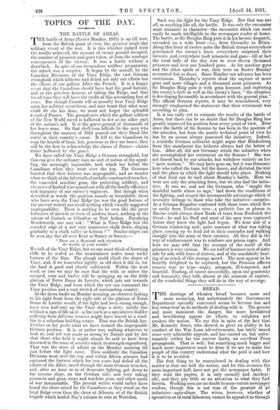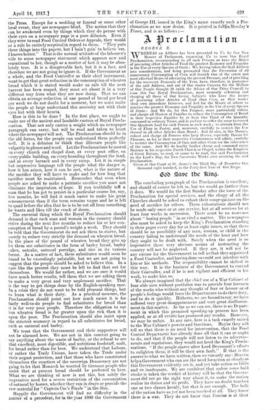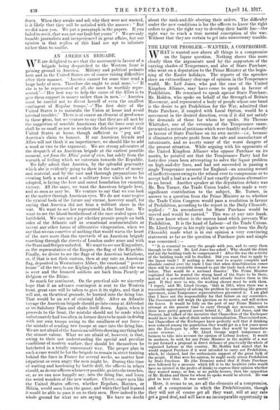BREAD. T HE shortage of wheaten bread becomes more and more
menacing, but unfortunately the Government Department specially concerned seems to become less and less competent in its methods of dealing with it. The greater and more imminent the danger, the more bewildered and bewildering appear its efforts to enlighten and awaken the nation. We say this in spite of the fact that Mr. Kennedy Jones, who showed so great an ability in his conduct of the War Loan advertisements, has lately issued some very admirable appeals, and has carried on, but unfor- tunately within far too narrow limits, an- excellent Press propaganda. That is well ; but something much bigger and much more impressive must be done if we are to make the people of this country understand what the peril is and how it is to be avoided.
The first thing to be remembered in dealing with this matter is that one half the nation, and for this occasion the more important half, have not got the newspaper habit. If they read the papers, it is only casually and incident- ally, and they pay little or no attention to what they find therein. Working men are no doubt to some extent newspaper readers, though this is not true of the greatest of all industries—agriculture. The wives, however, whether of operatives or of rural labourers, cannot be appealed to throug.h the Press. Except for a wedding or funeral or some other local event, they are newspaper-blind. The notion that they can be awakened even by things which they do peruse with their eyes on a newspaper page is a pure delusion. Even if they were to read Food Control Orders or Appeals, they would as a rule be entirely sceptical in regard to them. " They puts these things into the papers, but I bain't goin' to believe 'em. I knows better." That is the normal attitude of the labourer's wife to some newspaper statement which appears new and sensational to her, though as a matter of fact it may be abso- lutely true. It is a disagreeable fact, but it is a fact, and therefore we are not going to ignore it. If the Government as a whole, and the Food Controller as their chief instrument, want to get that great reduction in the consumption of wheaten bread which it is stated would make us safe till the next harvest has been reaped, they must set about it in a very different way from what they are now doing. That we can obtain an average reduction of one pound of bread per head per week we do not doubt for a moment, but we must make the people at large understand this necessity not with their eyes but with their hearts.
How is this to be done ? In the first place, we ought to make use of the ancient and laudable custom of Royal Procla- mation. That not only carries a weight which no newspaper paragraph can carry, but will be read and taken to heart where the newspaper will not. The Proclamation should be in the old forms, for the people can understand them perfectly well. It is a delusion to think that illiterate people like vulgarity in phrase and word. Let the Proclamations be posted on every church and chapel door, at every post office, on every public building, on every hoarding throughout the land, and at every barrack and in every camp. Let it in simple but impressive language tell the people what the danger is, how it has arisen, how it can be met, what is the nature of the sacrifice they will have to make and for how long that sacrifice must be maintained. Remember that even when people are asked to make a patriotic sacrifice you must not eliminate the inspiration of hope. If you truthfully tell a man that he has got to persist in a particular course for, say, five months, he will find it much easier to make his great renouncement than if the term remains vague and he is left to quail before the idea that he is to be cut off from something he wants and likes till the crack of doom.
The essential thing which the Royal Proclamation should demand is that each man and woman in the country should strive during the next five months to reduce his or her con- sumption of bread by a pound's weight a week. They should be told that the Government do not ask them to starve, but merely to reduce very strictly the demand on wheaten bread. In the place of the pound of wheaten bread they give up let them use substitutes in the form of barley bread, barley cakes, oatcake, oatmeal porridge, and rice in its various forms. As a matter of fact, these substitutes would soon be found to be exceedingly palatable, but we are not going to suggest that the people should be asked to believe this. In a case like the present they must be left to find that out for themselves. We would far rather, and we are sure it would have much better results, tell them that we are asking them to make a very great and very unpleasant sacrifice. That is the way to get things done by the English-speaking race. In a crisis they do not want to be told pleasant things, but to learn what is their duty. As a practical measure, the Proclamation should point out how much easier it is for fairly well-to-do people to find substitutes for bread than it' is for very poor people. Therefore the obligation to eat less wheaten bread is far greater upon the rich than it is upon the poor. The Proclamation should also insist upon the strictest economy in regard to all substitutes for bread, such as oatmeal and barley.
We trust that the Government and their supporters will not be alarmed here. We are not in this context going to • say anything about the waste of barley, or the refusal to use that excellent, most digestible, and nutritious foodstuff, malt, for bread rather than for beer. We understand that Labour, or rather the Trade Unions, have taken the Trade under their august protection, and that those who have constituted themselves the courtiers of the sovereign Democracy are not going to let that Monarch be worried by tiresome people who insist that at present bread should be preferred to beer. What we are thinking of now is not this, but solely the imperative need for a severe restriction of the consumption of oatmeal by horses, whether they run in drays or provide the raw material for " Captain Coe's Finals" in the Star.
Happily the Government will find no difficulty in the matter of a precedent, for in the year 1800 the Government
GEORGE R.
WHEREAS an Address has been presented to Us by Our Two Houses of Parliament, requesting Us to issue Our Royal Proclamation; recommending to all such Persons as have the !dentin of procuring other Articles of Food the greatest Economy and Frugality in the Use of every Species of Grain : We, having taken the Said Address into consideration, and being persuaded that the Prevention of all unnecessary Consumption of Corn will furnish One of the surest and most effectual Means of alleviating the present Pressure, and of providing for the necessary Demands of the Year, have, therefore, in pursuance of the said Address, and out of Our tender Concern for the Welfare of Our People thought fit (with the Advice of Our Privy Council) to issue this Our Royal Proclamation, most earnestly exhorting and charging all those of Our loving Subjects who have the means of procuring other Articles of Food than Corn, as they tender their own immediate Interests, and feel for the Wants of eaters to practise the greatest Economy and Frugality in the Use of every Species of Grain : And We do, for this Purpose, more particularly exhort and charge all Masters of Families to reduce the Consumption of Bread in their respective Families by at least One Third of the Quantity consumed in ordinary Times, and in no Case to suffer the same to exceed One Quartern Loaf for each Person in each week ; to abstain from the Use of Flour in Pastry, and, moreover, carefully to restrict the Use thereof in all other Articles than Bread : And do also, in like Manner, exhort and charge all Persons who keep Horses, especially Horses for Pleasure, as far as their respective Circumstances will admit, carefully to restrict the Consumption of Oats and other Grain for the subsistence of the same. And We do hereby further charge and command every Minister in his respective Parish Church or Chapel, within the Kingdom. of Great Britain, to read, or cause to be read, Our said Proclamation on the Lord's Day, for Two Successive Weeks after receiving the said Proclamation.
Given at Our Court at St. James's the Third Day of December One thousand eight hundred, in the Forty.first Year of Our Reign.
00 %aye the The concluding paragraph of the Proclamation is excellent, and should of course be left in, but we would go further than it does. We would fix the first Sunday after the issue of the Proclamation for special services, and the clergy of all the Churches should be asked to exhort their congregations on the need of sacrifice for others. These exhortations should not be made only once or at one service, but at all services for at least four weeks in succession. There must be no nonsense about " boring people " in so vital a matter. The newspapers also must be asked to keep the King's Proclamation standing in their pages every day for at least eight issues, so that there should be no possibility of any man, woman, or child in the country failing to understand the needs of the hour and how they ought to be dealt with. Surely when the need is so imperative these very obvious means of instructing the country will not be neglected. If they are, it will not be any excuse for the Government to tell us that they appointed a Food Controller, and having done so could not interfere with him or his methods. The responsibility cannot be shifted in this way. It is the business of the Government to control their Controller, and if he is not vigilant and efficient in his work, to make him so. We always imagined that the chief use of a War Cabinet of four able men without portfolios was to provide four foremen of the works who without any thought of fear or favour or of people's feelings would force the Departments to do their duty. and to do it quickly. Hitherto, we arc bound to say, we have suffered very great disappointment and very great disillusion- ment in this matter. As far as we can see, there is no Depart- ment in which this promised speeding-up process has been applied, or at all events has produced any results. However, we may be unfair. At any rate, here is a task exactly suited to the War Cabinet's powers and functions. Maybe they will tell us that there is no need for intervention, that the Food Control Department has already done all that it can or ought to do, and that if the people will not listen to its advertise- ments and regulations, they would not heed the King's Procla- mations. "If the people starve after Lord Devonport's efforts to enlighten them, it will be their own fault." if that is the answer to what we have written, then we can only say : Heaven help a Government who can see the need for action as clearly as this Government evidently see it, and yet take action so futile and so inadequate. We are confident that unless some bold stroke is taken the verdict of history will be that the Govern- ment did not go the right way about it, to make the nation realize its duties and its perils. They have no doubt touched one or two classes keenly, but that is not enough. The bulk of the nation have as yet not been touched at all. They know there is a. war. They do not know that Famine is at their of George III. issued in the King's name exactly such a Pro- clamation as we now desire. It is printed in full fin Monday's Times, and is as follows :—
prorlantation
doors. When they awake and ask why they were not warned, is it likely that they will be satisfied with the answer : " But we did warn you. We put a paragraph in the papers. If you failed to see it, that was not our fault but yours " ? We are only humble journalists and inexperienced in great affairs, but our opinion is that replies of this kind are apt to infuriate rather than to soothe.




























 Previous page
Previous page